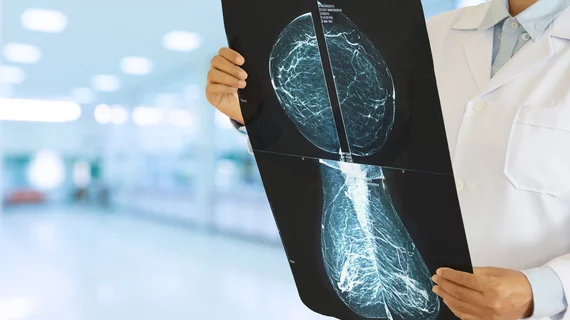Postpone all but the most dire breast imaging, ACR, cancer centers and surgeons advise
Several major medical societies and cancer groups are urging radiologists to put most breast imaging on hold until further notice.
That’s according to a joint statement issued by the American College of Radiology, Society of Breast Surgeons and others. The groups convened an expert panel of stakeholders to help determine what types of breast care are most urgent and which procedures can wait until the pandemic clears.
They ranked services from Priority A to C, and breast imaging, the groups wrote, rarely falls into the most-pressing category. The exception is if imaging is urgent for situations such as severe breast abscesses or serious complications following surgery.
“The risk of disease progression and worse patient outcomes should be weighed against risk of patient and staff exposure to the virus,” Debra Monticciolo, MD, president of the ACR, said in a statement.
Meanwhile, several instances fall into the category of Priority B imaging—defined as when a patient’s condition does not require immediate attention but treatment should begin before the pandemic ends. Those include diagnostic imaging for an abnormal mammogram or suspicious breast symptoms; biopsies for BI-RADS 4 or 5 lesions; and breast MRI for evaluating the extent of disease or pre-chemo assessment.
Most other breast imaging would fall into the Priority C category and could safely be deferred until after the pandemic. Some examples would include BI-RADS 3 patients returning for a short-term, follow-up diagnostic mammogram or ultrasound, or any routine annual breast screenings.
“As hospital resources and staff become limited, it is vital to define which breast cancer patients require urgent care and which can have delayed or alternative treatment without changing survival or risking exposure to the virus,” Jill Dietz, MD, president of the American Society of Breast Surgeons, added in a statement.
The entire 28-page document can be read here, and it will be printed in an upcoming issue of the peer-reviewed journal Breast Cancer Research and Treatment. The statement is also endorsed by the National Accreditation Program of Breast Centers, National Comprehensive Cancer Network and the American College of Surgeons’ Commission on Cancer.
Last month, breast cancer advocacy group Susan G. Komen had urged radiologists to postpone any routine imaging until it’s safe. The FDA has also suspended inspections of such facilities and issued guidance for those that choose to shutter temporarily.

